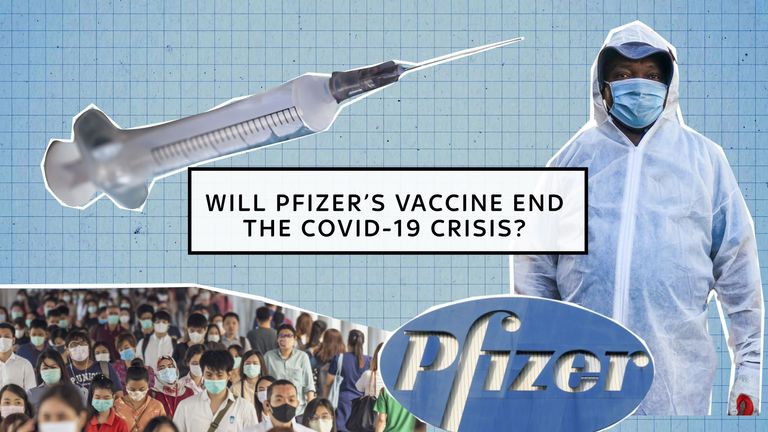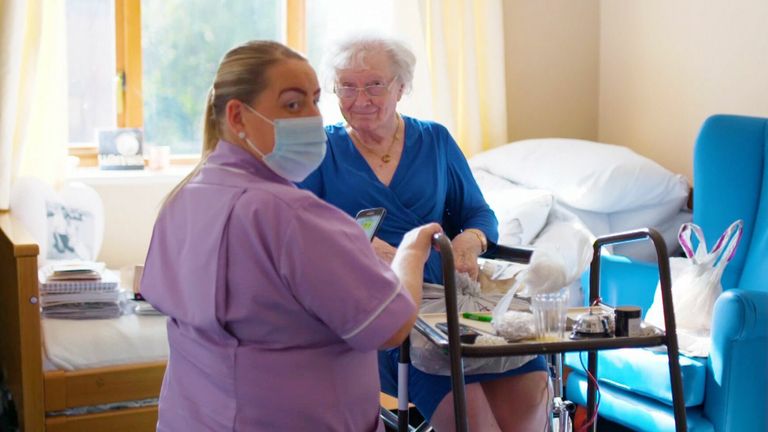Ten million doses of a potential COVID-19 vaccine could be available to the UK by the end of this year, but there is scepticism about whether the jab would work effectively.
Sky News has spoken to experts to answer some of your queries and concerns about the Pfizer/BioNTech vaccine, which the companies claim prevented 90% of people getting coronavirus in the late stages of its trial.
The vaccine has been developed very quickly, is it safe?
It has only been a matter of months, but scientists have said the public should be reassured the speed in which the vaccine has been developed does not mean it is not safe.
Pfizer and BioNTech said there were no serious safety concerns from their trial.
For safety purposes, the same number of people (nearly 45,000) as any vaccine trial had to be tested and in the same time frame.
Professor Heidi Larson, director of the Vaccine Confidence Project, said the process was able to be shortened by efficiencies that have not been seen before.
Following the Ebola crisis, emergency funding mechanisms were put in place in case of an emergency, such as COVID-19, so money could be allocated very quickly, unlike for previous vaccines.
The use of new technologies – including mRNA which is what the Pfizer/BioNTech vaccine uses – has also speeded things up, as has any administration procedures which can often hold up scientific advances.
Prof Larson added: “The safety regulatory process is still there but the time frame between things, they’ve tried to shorten, just in terms of it’s not sitting in a pile of things to be approved.”
What is RNA and could this type of vaccine affect people’s genetic code?
RNA is the nucleic acid that converts DNA into proteins. It carries the genetic information of the COVID-19 virus.
mRNA (messenger RNA) vaccines have become a possibility over the past few years and unlike conventional vaccines, which are produced using weakened forms of the virus, RNA vaccines use only the pathogen’s genetic code.
They introduce an mRNA sequence into the body that contains the genetic instructions for the person’s own cells to produce the vaccine antigens and generate an immune response.
Most standard vaccines work by injecting a dead or weakened form of the pathogen into the body which then builds immunity to it as the immune system learns to recognise and respond to the infectious agent.
Prof Larson said: “It does not change your DNA, it changes the behaviour of the virus, but not your DNA.”
RNA vaccines are known to have a higher potency than standard vaccines, can be developed more rapidly at a lower cost and are safe to administer.
Will the vaccine be mandatory?
No. Health Secretary Matt Hancock said the government is not proposing to make it so.
But Prof Larson said: “I can see it becoming mandatory in healthcare centres where people are putting themselves at risk and working with vulnerable patients.”
How effective is the Pfizer/BioNTech vaccine?
Independent experts found it was more than 90% effective at preventing people from getting COVID-19.
The World Health Organisation has said 50% efficacy is the minimum for an acceptable COVID-19 vaccine, so this is much higher.
Pfizer and BioNTech still have to finish the trial so there is a risk it is not as effective once the trial is complete, but scientists agree it is likely to remain well above 50%.
Flu vaccines are only 40-60% effective as the virus evolves every year, while two doses of the measles vaccine are 97% effective.
How long will immunity last?
As phase three of the trial only began on 27 July, there has not been enough time to tell how long the effects of the vaccine will last.
Eleanor Riley, professor of immunology and infectious disease at the University of Edinburgh, said: “We know nothing yet about the severity of cases that were seen in the trial, whether infection or infectiousness was prevented, or how long the immunity is expected to last.
“But, I think we have reason to be cautiously optimistic.”
Will the vaccine work on elderly and more vulnerable people?
Pfizer said 42% of participants had “racially and ethnically diverse backgrounds”, and older people were also included in the test.
The trial, which gave some people the vaccine and others a placebo, has only identified 94 positive COVID-19 cases so far.
Those involved in the trial do not know if they had the vaccine or not, but the independent experts deemed enough had not caught COVID-19 to say it was 90% efficient.
Scientists say 94 cases is not enough to determine if it will protect the elderly as much as everyone else and the trial will continue until 164 people have tested positive.
Most vaccines do not work as well for older people as they do for younger people because their immune systems are generally not as strong.
Until it finishes, the efficacy of the vaccine in different groups will not be known.
However, scientists are cautiously optimistic the results so far mean it will be effective for older people.
Will the vaccine prevent transmission?
It is not yet clear whether the vaccine could protect against being infected or just against developing symptoms once someone is infected.
If it was the latter there would be concern vaccinated people could be carrying the virus and would then be able to spread it.
Dr Penny Ward, chair of the education and standards committee of the Faculty of Pharmaceutical Medicine, said: “The question on transmissibility might not be assessed at this time – if the overall incidence of infection is the same in both placebo and vaccinated groups then transmission from a vaccinated person to others remains possible.”
Will people in the UK take up the vaccine?
Research by the London School of Hygiene and Tropical Medicine found nine out of 10 parents and guardians in England would likely have a COVID-19 vaccine.
A survey of 1,252 people with a child aged 18 months or younger said they definitely or most likely would get the vaccine for themselves while 89% said they would have their child vaccinated.
The study also found that people who are black, Asian, Chinese, mixed or another ethnicity were three times more likely to say they would reject a vaccine for themselves or their child than white people.
People earning less than £35,000 were twice as likely to reject a vaccine than those earning more.
And a study by the Vaccine Confidence Centre found fewer people in the UK and the US would “definitely” take a vaccine than the 55% required for herd immunity.
In the UK, 54% of the 8,000 respondents said they would be willing, but that fell by 6.4% when they read misinformation online about the vaccine.
Americans were more disbelieving of misinformation as the number dropped by just 2.4% – but only 41.2% said they would have the vaccine in the first place.






